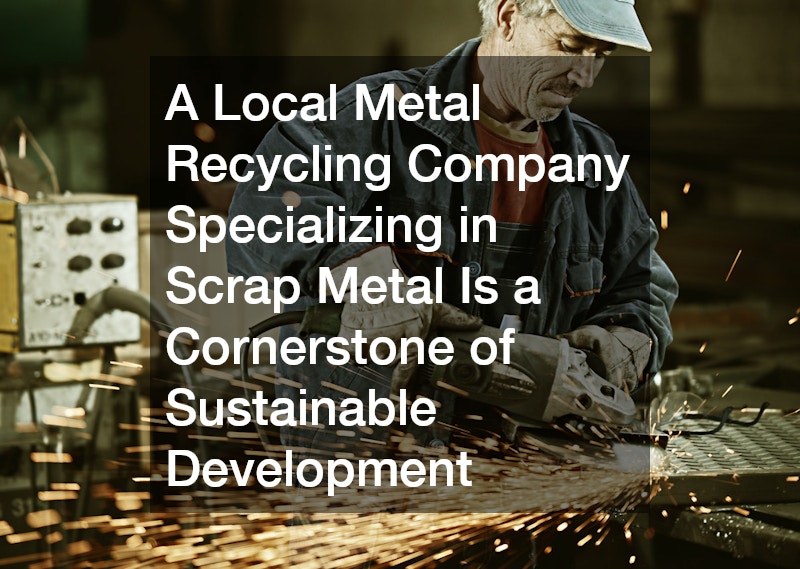In the modern world, sustainability has become an essential component of responsible business practices. One industry that plays a crucial role in promoting sustainability is metal recycling. A local metal recycling company, specializing in scrap metal, serves as a valuable resource for reducing waste and conserving natural resources. By recycling metals, these companies help to decrease the demand for raw materials and minimize the environmental impact of metal production.
Metal recycling is not only beneficial for the environment, but it also presents significant economic advantages. Recycling metal conserves energy, reduces pollution, and creates jobs within local communities. A thriving local metal recycling company thus contributes to both environmental preservation and economic growth. As more industries and individuals become aware of these benefits, the demand for efficient metal recycling services continues to grow.
This article will explore the vital role that a local metal recycling company plays in today’s society. By examining the processes involved in metal recycling, we will see how these companies help to create a sustainable future. We will highlight the social and economic impacts of their operations within local communities. Through understanding these aspects, we can better appreciate the importance of supporting local metal recycling efforts.
Understanding the Metal Recycling Process
Metal recycling begins with the collection and transportation of scrap metal to a recycling facility. Local metal recycling companies often have dedicated services to assist in gathering scrap materials from various sources. After the metal arrives at the facility, it undergoes a thorough sorting process to separate different types of metal. This step is crucial, as each metal has unique properties that require specific recycling techniques.
Once sorted, the metals are cleaned to remove any contaminants such as paint, rust, or other non-metallic materials. Cleaning ensures higher quality in the final recycled product and contributes to better efficiency in subsequent recycling processes. A local metal recycling company often employs advanced technologies to enhance cleaning processes, thereby improving overall recycling outcomes. This focus on quality control is vital in maintaining the integrity and usability of recycled metals.
After cleaning, the metals are melted in furnaces designed to accommodate specific metal types. This phase of the recycling process is energy-intensive, but still significantly less so than producing metal from raw ores. By utilizing recycled materials, a significant amount of energy is conserved, and carbon emissions are reduced. Once melted, the metal can be cast into new shapes or forms for manufacturing, thus completing the recycling loop.
Community and Economic Impacts
Local metal recycling companies have a profound impact on their communities through job creation and economic stimulation. By providing jobs within recycling facilities and related services, these companies bolster local economies. They often employ a diverse workforce, contributing to job opportunities across a range of skill levels. Additionally, the demand for recycled products supports various manufacturing sectors, further enhancing economic activity.
The presence of a local metal recycling company also supports community efforts to promote sustainable practices. Community members are encouraged to recycle scrap metal, which helps to reduce waste in local landfills. Educational initiatives and partnerships with local organizations often help raise awareness about the benefits of recycling. By engaging the community in these efforts, recycling companies foster a culture of environmental responsibility.
Economically, the cost savings associated with using recycled metals over virgin materials are considerable. These savings can translate into lower production costs for manufacturers who utilize recycled materials, ultimately benefiting consumers. Recycling metals helps stabilize metal markets by providing a steady supply of secondary raw materials. This aspect of the recycling industry is vital for maintaining a balance between supply and demand in the metal production sector.
Challenges and Future Directions
Despite the benefits, local metal recycling companies face several challenges, including fluctuating market prices for scrap metal. Market volatility can impact the profitability and sustainability of recycling operations. Companies must adapt to changes in demand and pricing to maintain viability in a competitive landscape. As the industry evolves, innovation and technological advancements become pivotal in overcoming these challenges.
Technological advancements play a crucial role in enhancing recycling efficiency and quality. Investments in research and development help companies adopt new technologies for sorting, cleaning, and processing metals. These advancements allow recycling companies to maximize recovery rates and improve the quality of recycled products. By staying at the forefront of innovation, a local metal recycling company can effectively address operational challenges and meet increasing market demands.
Looking forward, the future of metal recycling is promising due to increasing awareness of environmental issues. With governments and organizations worldwide prioritizing sustainability, the demand for recycled products is expected to rise. Local metal recycling companies are well-positioned to capitalize on these trends by expanding their services and outreach. By fostering strong community ties and embracing technological innovations, these companies will continue to play a crucial role in achieving a sustainable future.
A local metal recycling company specializing in scrap metal is a cornerstone of sustainable development. Through efficient recycling processes, these companies conserve natural resources and reduce environmental impact. They stimulate local economies by creating jobs and supporting manufacturing activities. The continued success of metal recycling operations hinges on adapting to market changes and technological advancements.
Community involvement is another key factor in the success of local metal recycling initiatives. By promoting recycling practices and raising awareness, these companies help communities transition towards sustainable living. A collaborative approach, involving businesses, individuals, and government entities, strengthens these efforts. Consequently, investing in local metal recycling is an investment in a healthier planet and a more resilient economy.
We must recognize and support the vital work that these companies do in building a sustainable future. As consumers and industry stakeholders, each of us can contribute to this cause by choosing to recycle and purchase recycled products. By doing so, we can ensure that the positive impacts of metal recycling continue to grow. Together, we can move towards a world where environmental preservation and economic prosperity go hand in hand.





